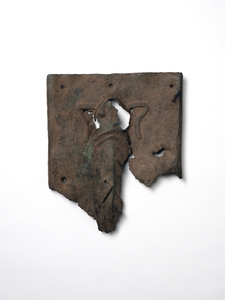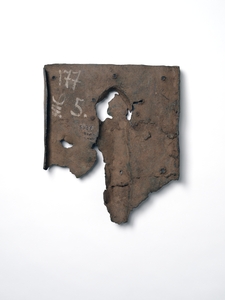Linden-Museum Stuttgart: 005377
| Linden-Museum Stuttgart: 005377 License: Attribution-NonCommercial-ShareAlike 4.0 International (CC BY-NC-SA 4.0) |
|
| Linden-Museum Stuttgart: 005377 License: Attribution-NonCommercial-ShareAlike 4.0 International (CC BY-NC-SA 4.0) |
|
Object description
This information was provided by the German museum where the object is currently located or where it was located prior to restitution.
| Object Name | High relief (copper alloy) plaque depicting a catfish |
| Description | About 900 of these rectangular metal plates were cast between 1550 and 1608 and nailed to the wooden pillars that supported the gallery roofs and adorned the courtyards of the Royal Palace. Later they were kept in interior rooms. On this plate is depicted a catfish. The trembling catfish (Malapterurus electricus) is a symbol of the king's power, as it can give out electric shocks. The society of the kingdom, which had no writing, recorded values and also important events in their "bronzes", in order to remember and visualize them. Thus, history, social order, values, etc. could be read from these works of art. Thus, they had mnemonic functions as a "collective memory" in addition to their sacred character. Text: Dietmar Neitzke. |
| Type | Relief |
| Materials | Copper alloy |
| Size, Dimensions | Length: 35.6 cm. Width: 20.3 cm. |
| Dating of Object |
Museum / Collection / Acquisition
This information was provided by the German museum where the object is currently located or where it was located prior to restitution.
| Museum | Linden-Museum Stuttgart |
| Museum Inv.-No | 005377 |
| Collector | Felix von Luschan (Berlin) purchased a large number of royal objects produced in the Benin Kingdom and sold parts of the collection to other museums. The objects reserved for Stuttgart were paid by Karl Knorr (Heilbronn, Germany). |
| Acquisition date | 1899 |
| Circumstances of acquisition | In October 1898, the Hamburg company "H. Bey & Co" offered the Berlin Ethnological Museum a Benin collection that came directly from Africa. However, due to a lack of funds, the entire collection could not be purchased and was therefore to be passed on to other interested parties. Felix von Luschan of the Berlin Museum therefore informed Karl Graf von Linden in November 1898, and offered him a right of first refusal. The Linden Museum then made 15,000 M available for the purchase of objects. The purchase price was paid by the Heilbronn entrepreneur Karl Knorr, which is why the collection became known as "Die Karl Knorr'sche Sammlung von Benin-Altertümern". Von Luschan published a detailed description of the collection under the same title (1901) on behalf of Count Linden and Knorr. Other buyers of the collection included the museums in Vienna and Munich, but also people such as Hans Meyer (Leipzig) and Eugen Rautenstrauch (Cologne). Text: Markus Himmelsbach. |
| Notes |
Current ownership status and location
| Status | restituted |
| Date of last status change | 14 December 2022 |
| Current ownership | Federal Republic of Nigeria |
| Holding institution | National Commission for Museums and Monuments (NCMM, Nigeria) |
| Current location | Temporarily at the Linden-Museum Stuttgart |
Categorization for the search functions
This information was included by the German Contact Point for Collections from Colonial Contexts and is intended to make the object easier to find in the database.
| Object Type | relief |
| Materials | metal; copper alloy |
| Tags |
Dataset
| ID | 118 |
| last Change | 2023-01-26 12:15:00 |
| License | Linden-Museum Stuttgart |

